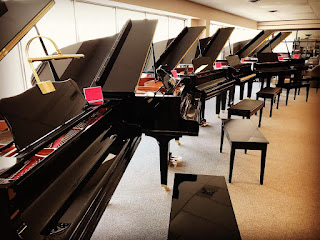Guidance To Buy A Piano: The Basics Of Choosing And Buying
It's not easy to buy a piano. Sure, you can go to a music stores Winnipeg and plop down your cash on the first one that catches your eye, but there are a lot of factors to consider before making that purchase. In this article, we'll go over the basics of choosing and buying a piano, so you can make an informed decision and get the best deal possible.
What To Look For In A Piano
When it comes to buying a piano, there are a few things you should keep in mind. Here are some tips to help you find the perfect one for your needs.
First and foremost, make sure you have a clear idea of what you want. Do you want an acoustic piano or an electronic one? How big do you need it to be? Do you want an upright or grand piano? Once you have a general idea of what type of piano you are looking for, start narrowing down your options by looking at different models and brands.
Another important factor to consider is the price. Pianos can range in price from $100 to $10,000 or more, so make sure you have a budget in mind before starting your search. Also, be sure to check out used pianos if that is what is available to you. Many times, these instruments are in great condition and offer great value for your money.
Last but not least, be sure to take the time to play the different models and keyboards that are available before making your purchase. This will help you get a sense of how each one sounds and feels before making a decision.
How Much To Spend
One of the first decisions you'll need to make when buying a piano is how much you're willing to spend. The piano is a big investment, and there's no need to overspend just because you love the sound of the instrument! Here are some tips to help you find the best price for your piano without breaking the bank:
-Start by calculating how many hours of practice a week you plan on allotting to your new piano. If you're only using it a few times a month, then a cheaper instrument might be ideal. On the other hand, if you plan on practicing several hours a day, then you'll likely want to invest in a higher-quality model.
-Consider your musical goals. If you want to start playing professionally or learn more advanced pieces, then you'll likely want to invest in a better-quality instrument. However, if all you want is to have some fun playing songs from your childhood, then a lower-quality model might be just fine.
-Be realistic about your budget. Don't buy something just because it's within your budget - instead, think about what's important to you and what will give you the best sound for your dollar.
The Different Types of Pianos
When it comes to buying a piano, there are a few things you need to know to make an informed decision. The Different Types of Pianos below will help you understand the different types of pianos on the market and what each one has to offer.
The first thing to consider when buying a piano is the size. Pianos come in three main sizes: grand, upright, and side-by-side. Grand pianos are the largest and are best for playing classical music or large pieces that require a lot of space. Upright pianos are smaller than grand pianos and are better suited for jazz and blues music. Side-by-side pianos are the smallest and are best for smaller spaces or people who want to play together with someone else.
When choosing a piano, you also need to think about your budget. Pianos can range in price from around $1,000 to $100,000+. More expensive pianos usually have a better sound quality and are built more solidly than cheaper pianos. However, cheaper pianos can still be very playable and suitable for many purposes.
Finally, consider your personal preferences when choosing a piano. If you prefer digital pianos, for example, you'll likely want to look for a digital piano rather than an acoustic piano. If you're not sure what kind of piano you want, be sure to visit a few piano stores Winnipeg and play different pianos to see what feels comfortable and sounds the best to you.
Conclusion
When you are thinking about purchasing a piano, it is important to understand the basics of choosing and buying one. By following these guidelines, you will be able to make an informed decision that will benefit both you and the piano. Remember: a good pianist plays on a good piano!

Comments
Post a Comment